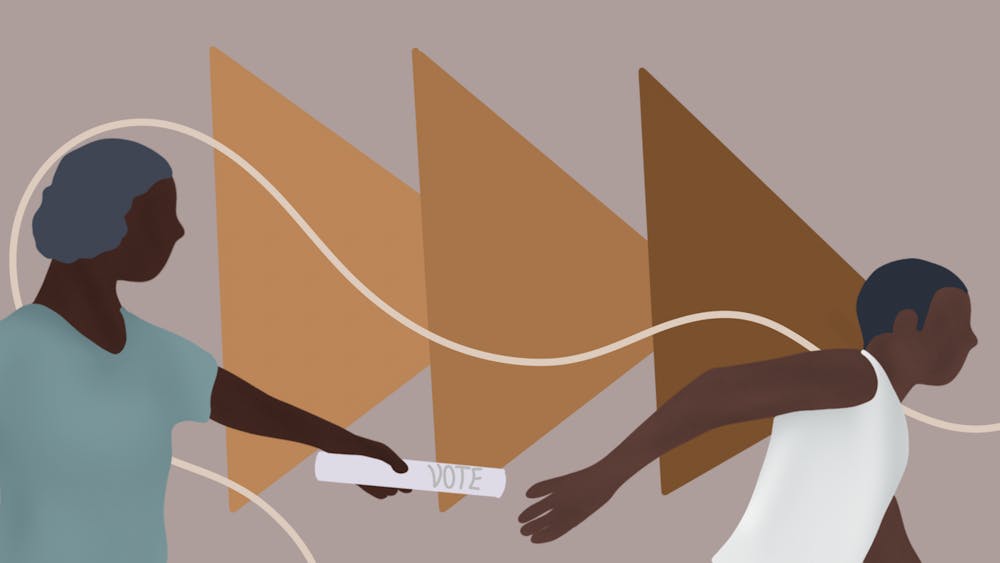Black voices have always been suppressed in regard to voting. Our ancestors fought hard for the right to vote — their determination and passion was unmatched. We have them to thank for our ability to vote. Our voices mean something and are more powerful than we realize.
On Sept. 22, 1862, President Abraham Lincoln signed the Emancipation Proclamation freeing slaves in the Confederacy. This gave individuals who were enslaved the opportunity to venture out into the world and make a life for themselves. Following the proclamation, Confederate General Robert E. Lee surrendered his position ending the Civil War on April 9, 1865.
Three years later, the 14th Amendment was ratified. This amendment gave citizenship to individuals born or naturalized in the United States. This included former slaves and granted all citizens equal protection of the laws. The 14th Amendment was one of three amendments passed during the Reconstruction era to abolish slavery and establish civil and legal rights for Black Americans.
Although the 14th Amendment granted former slaves citizenship, it did not give them access to voting polls. Therefore, the 15th Amendment was established in 1869 to give Black men the right to vote in the U.S., stating “The right of citizens of the United States to vote shall not be denied or abridged by the United States or by any state on account of race, color, or previous condition of servitude.” But this statement did not stop discriminatory practices in the late 1870s.
“Do you know I’ve never voted in my life, never been able to exercise my right as a citizen because of the poll tax,” said ‘Mr. Trout’, a Georgia resident in the 1930s, “I can’t pay a poll tax, can’t have a voice in my own government.”
Poll taxes, literacy tests, intimidation and the grandfather clause was exercised in order to stop the progression of Black voter registration across the south. Literacy tests forced individuals to read or write sections of the Constitution in front of voter registrars. According to the Library of Congress, if you couldn't pass a literacy test you must have had 40 acres or $300 worth of land.
The grandfather clause, which stated you could vote without worry if you or someone of your lineage was registered to vote before 1867, put restraints on Blacks whose lineage was full of slaves. These restrictions existed in Alabama, Louisiana, North Carolina, South Carolina, Virginia, Tennessee and Mississippi during the 1920s.
In 1965, the Voting Rights Act was passed to nullify the use of poll taxes and other voter suppression laws. President Lyndon B. Johnson was inspired by Martin Luther King Jr., and he passed this act in honor of his march from Selma, Alabama.
The first attempt of the Selma to Montgomery, Alabama, march for voting rights happened March 7, 1965. A group of at least 600 people began to march across the Edmund Pettus Bridge, but it was stopped by a blockade of state troopers commanded by John Cloud of the Alabama Department of Public Safety. Cloud ordered protesters to disperse, but when they didn’t, he ordered his men to advance with clubs and tear gas to violently attack them. Footage of the account shocked the nation and progressed the fight against racial injustice.
The second attempt of the march occurred March 25, 1965. Martin Luther King Jr. led a crowd of at least 25,000 demonstrators from Selma to the steps of the capitol in Montgomery. This five day, 54 mile march was inspired by Bloody Sunday and the senseless killing of Jimmie Lee Jackson who was protecting his mother from police as they protested nonviolently for voting rights on Feb. 18, 1965.
MLK and his demonstrators left Selma on March 21, 1965, protected by Federal Alabama National Guardsmen and FBI agents after the approval of Judge Frank M. Johnson. They marched tirelessly to the capitol, hoping for change.
Johnson later signed the Voting Rights Act on Aug. 6 of 1965 in the presence of MLK and other civil rights activists. This act banned the use of literacy tests, provided federal oversight of voter registration and authorized the U.S. attorney general to investigate the use of poll taxes. Prior to this act at least 23% of Black people were registered nationwide. By 1969, that number rose to 61% of Black people being registered to vote.
In more recent history, America was able to see its first Black president, Barack Obama, after he won the 2008 presidential election. Obama held his presidency for four years, and in 2012, Black voices would shock America once again when he was reelected. According to the New York Times, for the first time on record, Black voting rates surpassed that of non-Hispanic whites. About two million fewer white Americans voted in 2012 compared to 2008, while an estimate of 1.8 million more Blacks went to the polls. More than 90% of them voted to reelect Obama.
Don’t let your vote be suppressed by those who want to keep certain people from voting. Some of these tactics include: the cutting back of early voting, reducing voting hours or locations, restricting voter registration, strict voter ID requirements and long lines at the polls. The New Orleans Tribune indicated that in North Carolina there were 158 fewer early voting locations in 40 counties with large Black communities in 2016 than in 2012.
Black votes are just as important as any other vote. Our voices can help determine the fate of this country — because at the end of the day, minority groups are more likely to be affected by changes made.
Get out and vote by Nov. 3. Use your voice and make a change. Your ancestors will thank you.






